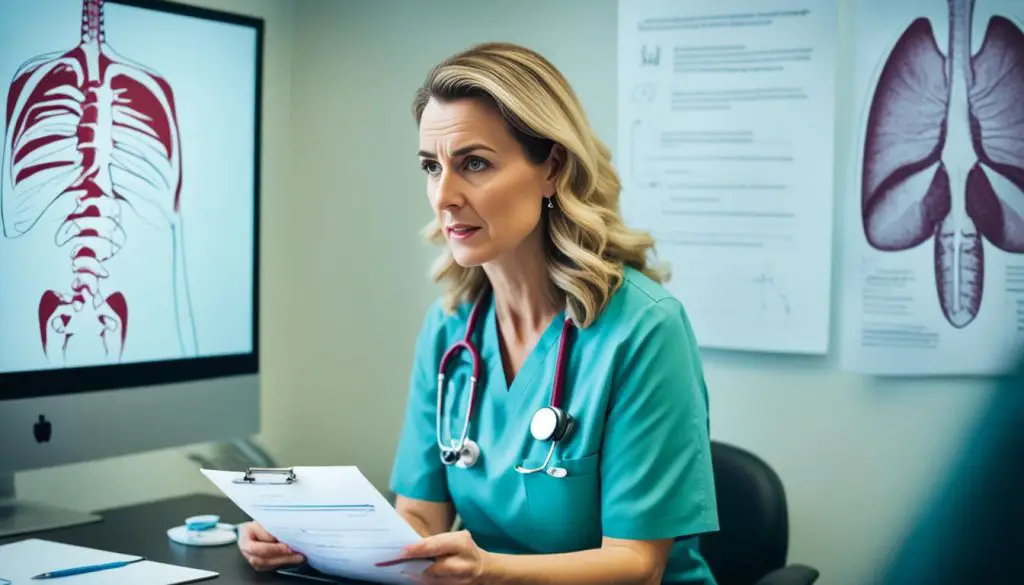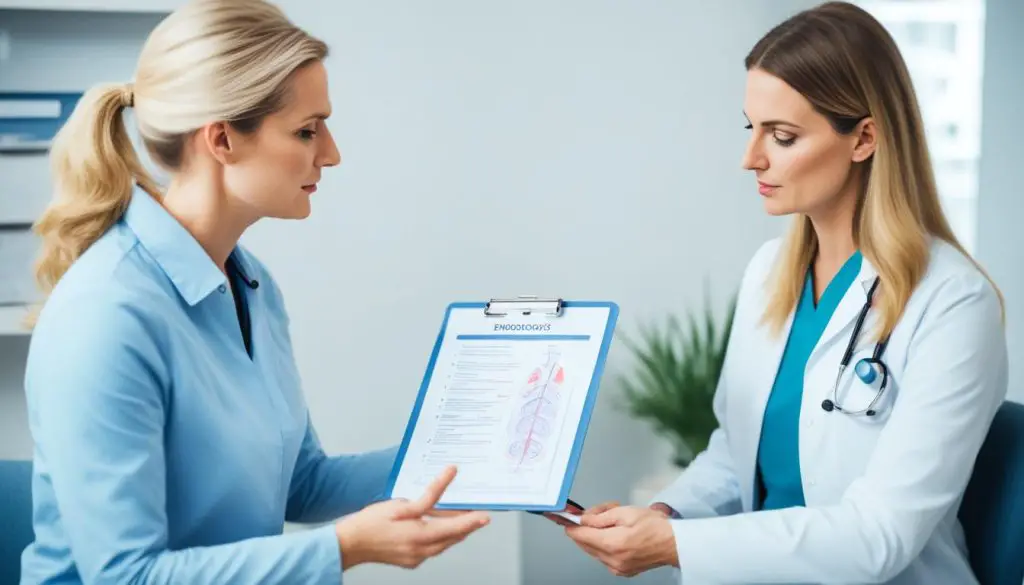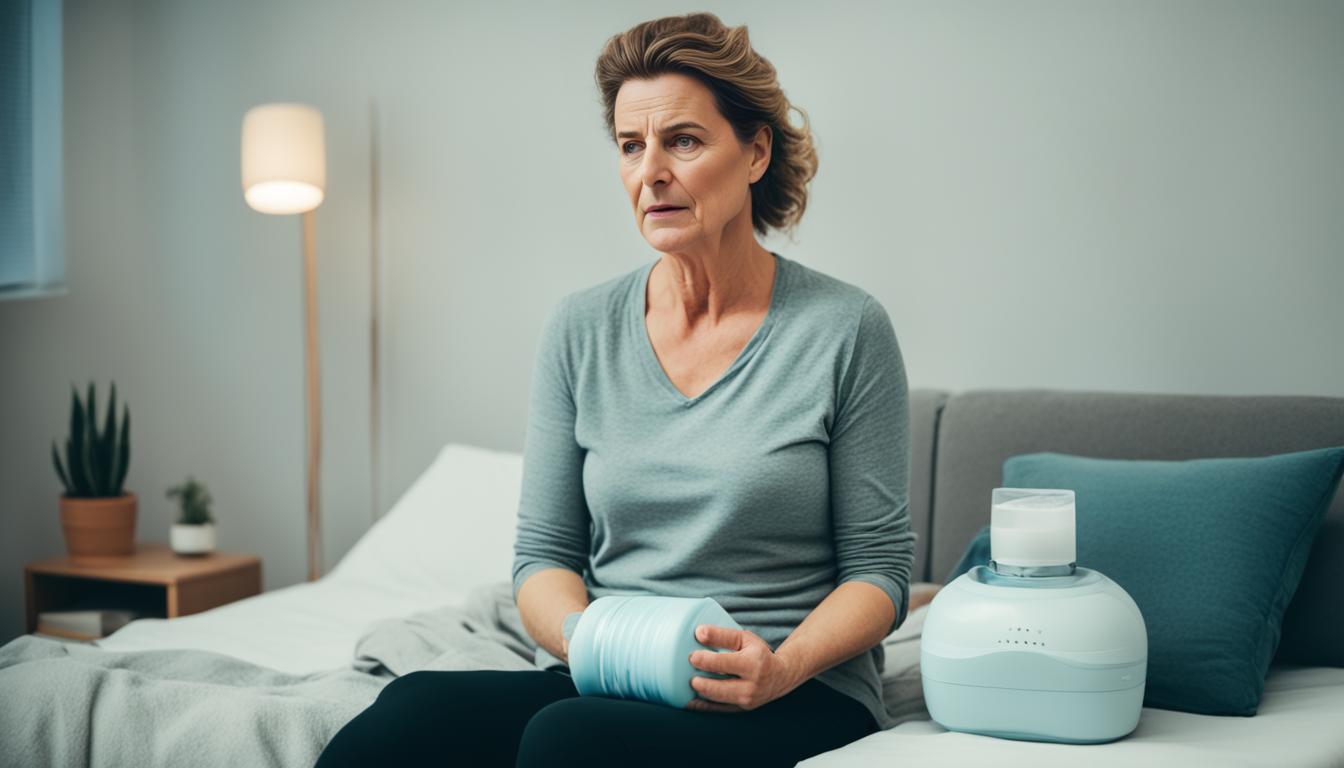Being married to a woman with endometriosis and fibromyalgia has taught me a lot. I see the struggles she faces, dealing with pain and surprise symptoms. It can be hard on both of us. Yet, I’ve found that non-sexual closeness helps us a lot. It supports her and deepens our bond.
The journey with endometriosis is unique for each person. But one thing is for sure – we both need support and understanding. Partners should work together through the good and tough times. The challenge then becomes how to be close without the physical part of intimacy?
Beating endometriosis needs more than just medical care. It takes a partner who gets you, who offers a space for sharing feelings. We’ve found different ways to connect. These ways build our relationship with care and acts of love that don’t rely on sex.
Endometriosis and couples gives tips that many have found useful. It talks about how to communicate better and when to get professional advice. It also suggests other ways to be intimate and why self-care is important. The article aims to help both the patient and their partner.
Seeing your loved one go through endometriosis is tough. But there is always hope. I have seen how we can make our relationship loving and strong, despite the challenges. I invite you to join me in this journey. Let’s explore how non-sexual closeness makes a difference for women with endometriosis.
The Impact of Endometriosis on Intimate Relationships
Endometriosis can greatly affect how intimate partners relate to each other. The severe pain and activity limits it brings can cut down on sexual acts. This might cause discomfort or pain during sex, leading to lower desire and intimacy.
It’s essential to explore other ways to connect and offer support. Learning more about endometriosis and its treatments is crucial. This knowledge helps couples support each other while dealing with the pain.
Connecting emotionally despite endometriosis calls for talking openly and showing understanding. Discover non-sexual activities that bring you closer. This could be enjoying hobbies together or just talking deeply.
It’s also crucial to know your treatment options. Talking to professionals and trying different treatments can lower pain. This lets you both take back control of your health and strengthen your bond.
If you want to learn more about how endometriosis affects relationships, check out Endometriosis UK. It’s a great website for info and support for couples facing this issue.
Communicating with Your Partner
Talking openly is vital for handling endometriosis’s impact on your relationship. Speak honestly about the issues this disease causes. This approach can deepen your connection and ensure mutual support. Remember, your partner is ready to help.
Help your partner understand endometriosis by sharing its details, like symptoms and treatments. This knowledge lets them offer better support. Talking about your pain and how it affects you emotionally can strengthen your bond. It also helps your partner join you on this journey.
When considering treatments, it’s wise to get advice from endometriosis experts. They can guide both of you to choose the best path. Learning about the treatments available helps in making a plan that focuses on your health and strengthens your bond.
Listening is as crucial as talking. Share what you need but also understand your partner’s feelings. This back-and-forth creates a supporting space for coping with endometriosis. It helps both of you face this challenge together.
Professional Advice for Endometriosis Patients
- Initiate open and honest conversations about the impact of endometriosis on your relationship.
- Share information and educate your partner about endometriosis, its symptoms, and treatment options.
- Seek professional advice from healthcare professionals who specialize in endometriosis.
- Develop a treatment plan together that prioritizes your well-being and supports your relationship.
- Create a safe space to listen to your partner’s perspective and feelings.
Discuss endometriosis openly and get expert advice to face it together. Remember, you are not alone. Your partner’s support is crucial on this journey.
Seeking Support from Your Doctor
When dealing with endometriosis, talking to your doctor is key. They can give you advice just for you and help you understand your options. A doctor looks at your symptoms and makes a plan to treat you. This might include meds or surgery to help you feel better.
If sex is painful, it’s important to talk to your doctor about it. They can help with tips to lower the pain. They might suggest different positions. Or they could find other ways to help you enjoy sex without pain.
It’s vital to speak up for yourself. Share what’s on your mind with your healthcare provider. Being involved in your care helps you and your doctor choose the best plan. It should meet your needs and goals.
If you want more info on endometriosis treatments, check out this detailed resource. It shares up-to-date research and ways to treat endometriosis.

Endometriosis Treatment Options
| Treatment Option | Description |
|---|---|
| Medications | Includes hormonal medications to regulate menstruation and control pain |
| Surgical Interventions | May involve laparoscopic surgery to remove endometrial tissue, cysts, or scar tissue |
| Pain Management Techniques | Non-surgical approaches such as physical therapy, acupuncture, or nerve blocks |
| Alternative Therapies | Complementary treatments like herbal remedies, dietary changes, or stress reduction techniques |
Exploring Alternative Intimacy
Living with endometriosis often makes sex painful. This means it’s important to find other ways to connect. Prioritizing emotional closeness is key. By enjoying non-sexual activities, you can still stay close and happy with your partner.
Cultivating non-sexual intimacy starts with simple acts like cuddling and hand-holding. These gestures build a strong bond. They provide comfort, even if sex isn’t possible. Doing things that make you both happy can increase your emotional connection and lead to shared joy.
Remember, a holistic approach to endometriosis care is essential. Focus on self-care and dealing with symptoms better. By taking care of your emotions, you can make your relationship stronger. This journey is easier when you support each other.
Looking at intimacy in a holistic way shows physical touch is just part of it. Building emotional closeness is vital. It’s about trust, good communication, and true understanding. This helps both you and your partner handle endometriosis challenges while keeping your love strong.
Getting help from healthcare pros and support groups is smart. They can offer advice and strategies. This support aids you and your partner in dealing with the emotional and physical effects of endometriosis.
Talking openly, showing respect, and being open to new ideas can lead to fulfilling intimacy. Remember, intimacy is more than sex. It’s about the deep connection you have with your partner.
Keep reading to find ways to manage endometriosis pain and discomfort better.
Recent research shows a holistic approach improves life quality and helps maintain good relationships.
Managing Pain and Discomfort
Living with endometriosis is tough, especially dealing with the pain. But, there are many treatments to make it better. Your doctor can help you find a plan that works for you.
Coping with endometriosis pain is unique to each person. Your doctor might suggest medicines like NSAIDs to ease pain. They also might mention birth control or other hormonal treatments to control symptoms.
Learning about your treatment options can help you decide how to handle your pain. For extreme cases or if you’re not thinking about having kids, surgeries like laparoscopy might be an option. Physical therapy can help too. It includes exercises and stretching to make the pain less.
Remember, what helps one person may not help another. It might take some time to find what works best for you. Stay patient and talk to your doctor about how you feel.
Self-care is also very important. Practicing relaxation techniques like deep breathing and yoga can lower stress. Heat therapy can soothe your pain. You can use a heating pad or take warm baths for relief.
Changing your lifestyle can also make a big difference. Eating a healthy diet and staying active are key. These can help you feel better overall and reduce your pain.
Supporting resources:
Timing and Preparing for Intimacy
Living with endometriosis makes planning for intimacy key. It helps in managing pain and discomfort. By planning intimate times well and using relaxation methods, you can make things better. This reduces negative symptoms during those moments.
Timing Intimate Moments
Picking the right moment for intimacy is crucial for those with endometriosis. It’s best to aim for the middle of your menstrual cycle, a time when pain tends to be less. Knowing your cycle well enables you to enjoy these moments with less discomfort.
Practicing Relaxation Techniques
Before intimacy, calming your mind can lower the pain and stress. Trying deep breathing or meditation calms and relaxes you. This creates a comfortable space, improving your intimate moments.

Experimenting with Alternative Activities
If sex is too painful, look for other ways to be close. Cuddling, sharing massages, or even just spending time together can be as fulfilling. These keep the emotional bond strong and help you stay connected.
| Benefits of Timing and Preparing for Intimacy | Benefits of Practicing Relaxation Techniques | Benefits of Alternatives to Sexual Intimacy |
|---|---|---|
| – Reduced pain and discomfort – Enhanced pleasure – Increased comfort during intimacy – Improved emotional well-being |
– Decreased anxiety and stress – Enhanced relaxation – Improved overall mood – Increased comfort during intimacy |
– Fosters emotional connection – Promotes non-sexual intimacy – Maintains and strengthens relationship bond – Reduces pressure and expectation |
When dealing with endometriosis, planning for intimacy is essential. By being careful and considerate of each other’s needs, you can find joy in these moments. Addressing each other’s comfort makes a big difference in building a close and understanding relationship.
Experimenting with Different Positions
When dealing with endometriosis, trying out various sexual positions can help lessen pain. The spots where endometriosis grows are different for everyone. So, it’s key to find positions that are comfy for you. Talking openly with your partner is a big help. This way, together, you can figure out what feels good and causes the least pain.
Testing different positions helps you and your partner find what’s most fun and works best. Keep in mind, each person’s endometriosis is different. So, discovering the right positions for you both is crucial.
Taking on new sex positions may need some time to figure out. But, it’s definitely worth it to keep your intimacy strong. Plus, good talks as you try new things are essential. These discussions make sure you both support each other and feel understood.
Comparison of Positions
| Position | Description | Pain Level | Pleasure Level |
|---|---|---|---|
| Missionary | This classic position involves the receptive partner lying on their back, while the penetrating partner is on top. | Low | Medium |
| Doggy Style | The receptive partner is on their hands and knees while the penetrating partner enters from behind. | Varies | Varies |
| Spooning | The couple lies side by side, with the receiving partner facing away while the penetrating partner enters from behind. | Low | Medium |
| Woman on Top | The receptive partner straddles the penetrating partner, allowing them to control the depth and angle of penetration. | Low | High |
Note: Pain and pleasure levels can differ based on each person’s situation. It’s vital to talk openly and pay attention to what your body tells you during sex.
Always talk with your doctor about any concerns you have regarding endometriosis and sex. Working with your healthcare provider is key to managing the impact of endometriosis on your sex life.
Seeking Emotional Support
Living with endometriosis can be hard, both physically and emotionally. It’s important for those with endometriosis and their partners to find emotional support. Having a strong support network can give you validation, understanding, and guidance.
Consider joining support groups. They are safe places to talk about your experiences. You can learn from others and realize you’re not alone. Support groups also offer new insights and ways to cope.
Talking to healthcare professionals is also key. Your doctors or gynecologists can provide advice on your treatment options. They help you understand how to manage your symptoms better.
Online communities provide a unique support system for endometriosis patients. You can talk to people with similar stories from the comfort of your own home. These spaces are great for finding comfort and learning from others.
Asking for emotional support is smart, not weak. It can help you manage your symptoms better. Support offers comfort, validation, and the strength to overcome the challenges of endometriosis.
For more information on managing endometriosis symptoms and finding emotional support, you can refer to this resource on PubMed.
Educating Yourself and Your Partner
Learning about endometriosis really makes a difference. It helps you and your partner understand and care for each other better. Keep up with new facts, treatments, and ways to care for those with endometriosis. Being informed makes you a better supporter and lets you walk the path together.
Endometriosis UK is a helpful group for those impacted by endometriosis and their partners. Their site has a lot of info, such as how to treat the condition, tips for self-care, and ways for couples to cope.
Teaching your partner about endometriosis can help them understand what you’re going through. It’s a team journey because endometriosis affects both of you. Helping and caring for each other is crucial to face the difficulties head-on.
Professional Advice for Endometriosis Patients and Support for Endometriosis Patients
Getting advice from experts is key in handling endometriosis well. Specialists can offer insights into what treatments and self-care you might need. They’ll guide you on the best path forward.
Joining support groups or speaking with others online can be comforting. These places are filled with people who share similar experiences with endometriosis. It can make you feel part of a community and validate your feelings.
Keep learning as much as you can about endometriosis, together. Stay informed on the latest studies, treatments, and care practices. The more you know, the better you can manage the symptoms of endometriosis.

| Benefits of Educating Yourself and Your Partner |
|---|
| 1. Enhanced understanding and empathy |
| 2. Informed decision-making regarding treatment options |
| 3. Strengthened support system within the relationship |
| 4. Improved communication about needs and challenges |
Managing Intimacy-Related Anxiety
Many people with endometriosis feel anxious about intimacy. The challenges it brings can cause worry. But, it’s key to deal with this anxiety for a healthy relationship.
Talk openly with your partner about your fears and worries. This builds understanding and support between you. Sharing your feelings can make you both closer.
Reassuring each other often is important. Talking about your love and support can ease anxiety. Remember, endometriosis isn’t the whole picture of your relationship.
Doing things like cuddling and giving massages can strengthen your bond. These activities enhance your emotional connection and lower stress.
Cuddling

Cuddling is a great way to feel close to each other. It makes you feel safe and relaxed. This helps decrease anxiety and improve well-being.
Massage
Massages are great for relaxation. They can be calming for both partners. Massaging each other can ease tension and makes your bond stronger.
Quality Time
Enjoy activities together that you both like. It could be watching a movie or cooking a meal. This creates memories and grows your connection.
Dealing with anxiety takes teamwork. Open talks, reassurance, and shared activities are important. They can make your relationship strong even with endometriosis challenges.
Supporting Each Other’s Emotional Well-being
Endometriosis is tough, on both the body and the mind. If you’re in a relationship with someone facing it, offering your support and understanding is crucial. This helps them deal with the ups and downs that come with this health issue.
Let’s look at some tips to boost your emotional well-being together:
1. Show Empathy
Try to imagine what it’s like for your partner. Understand their pain and hardships because of endometriosis. Show that you get it by saying, “I know this is really hard for you.”
2. Be Patient
Endometriosis can be draining and aggravating. So, be patient as they handle their symptoms and look for the best treatment. Let them know you’re always there for support.
3. Listen Actively
Offer a safe place for your partner to share their worries and annoyances. Listen actively by focusing on them, keeping eye contact, and replying with care. This makes them feel listened to and cared for.
4. Encourage Self-Care
Encourage them to put self-care first. Suggest they take breaks, try relaxation methods, or enjoy hobbies. Prioritizing themselves helps manage stress and boost their emotional health.
5. Seek Support Together
Look into support groups or therapy as a couple. Joining others with similar experiences can feel like finding a community. Plus, couples therapy can help you both deal with the strain of endometriosis.
You know your partner’s struggles like no one else does. Your support and care can immensely help them in their endometriosis journey.
Seeking Professional Help
If endometriosis is causing issues in your relationship, it might be time to get some help. Couples or solo therapy can offer a place to work on emotional problems connected to the disease. A therapist can give you professional advice for endometriosis patients, tips, and support to boost your connection.
A study showed that mental health support can make a big difference. It improves how you feel and your bond with your partner. In therapy, support endometriosis patients can figure out how to deal with the illness. You can talk about worries and problems about being close with your partner.
In therapy, you and your partner can pick up new ways to talk and understand each other better. A therapist gives a fresh, neutral view. They can help you use better ways to deal with issues and build a stronger relationship.
Getting help is about more than just the physical side of endometriosis. It’s also about working through the emotional effects on you and your partner. Therapy helps you both understand each other more and strengthens your connection.
Nurturing Self-Care and Self-Compassion
Living with endometriosis is tough, affecting your body and mind. It’s vital to focus on self-care and self-compassion. This helps you support your partner and maintain a close, loving bond.
Prioritizing Physical and Emotional Well-Being
Endometriosis impacts your body and feelings, making it key to look after your well-being. Find time for things that make you happy and relax. Adding yoga or walks to your day can help both your body and mind. Listen to your body and rest when you need to.
Practicing Self-Care Activities
Doing self-care activities helps you deal with the stress of endometriosis. Enjoy things that make you feel good, like reading, a bath, music, or mindfulness. When you’re looked after, you can support your partner better and keep a strong relationship.
Being Kind to Yourself
Handling endometriosis can be hard and sometimes you may feel frustrated. It’s crucial to be gentle with yourself. Don’t blame yourself for your struggles or compare your path to others. Show yourself the same love and understanding you would a dear friend.
Supporting Each Other
Understand that this journey is yours and your partner’s together. Cheer for each other’s self-care and focus on well-being. By caring for yourselves, you make your relationship stronger.
| Self-Care Tips for Endometriosis Patients |
|---|
| 1. Engage in activities that bring joy and relaxation. |
| 2. Prioritize physical and emotional well-being. |
| 3. Practice self-compassion and kindness. |
| 4. Support each other’s self-care efforts. |
Self-care isn’t selfish; it’s crucial for your health and your relationship’s strength. Take the time to care for yourself, be gentle with yourself, and support each other as you face endometriosis.
Building Resilience as a Couple
Facing challenges like endometriosis requires a couple to be resilient. It’s about talking openly, finding new ways to connect, and supporting each other emotionally and physically.
Open and honest talks build a strong relationship. Expressing your feelings and listening to each other’s needs are key. This helps in facing endometriosis together and making your bond stronger.
Endometriosis can impact your sex life. It’s crucial to discover other ways to be close. This might mean enjoying activities together or showing affection in non-sexual ways.
Taking care of each other’s feelings is very important. Endometriosis can be tough emotionally, for both partners. Be a source of comfort and motivate each other to stay mentally and physically healthy.
Stay united and tackle endometriosis as a team. Remember, there’s support out there, from doctors, support groups, and online forums. They can offer guidance on managing the condition.
Strategies for Building Resilience
| Strategies | Description |
|---|---|
| Effective Communication | Openly discuss your feelings, concerns, and needs; |
| Alternative Intimacy | Explore non-sexual forms of intimacy, such as cuddling and holding hands; |
| Supportive Environment | Provide comfort, understanding, and encouragement; |
| Self-Care | Encourage each other to practice self-care and engage in activities that promote overall well-being; |
| Seek Support | Reach out to healthcare professionals, support groups, or online communities. |
Conclusion
Living with endometriosis is tough, but finding the right support is key to keeping a strong bond with your partner. Being honest with each other helps you both understand how the illness affects your relationship. Seek advice from experts and join support groups for helpful tips and emotional support.
Try different ways to be close that don’t involve sex. Activities that bring you together emotionally are important. Also, take care of your well-being through self-care and staying up to date on treatment options.
It’s important to know you’re not alone. There are many resources to help you deal with endometriosis and stay close to your partner. Remember, taking things slowly, being kind to yourself, and understanding each other can get you through the tough times.
